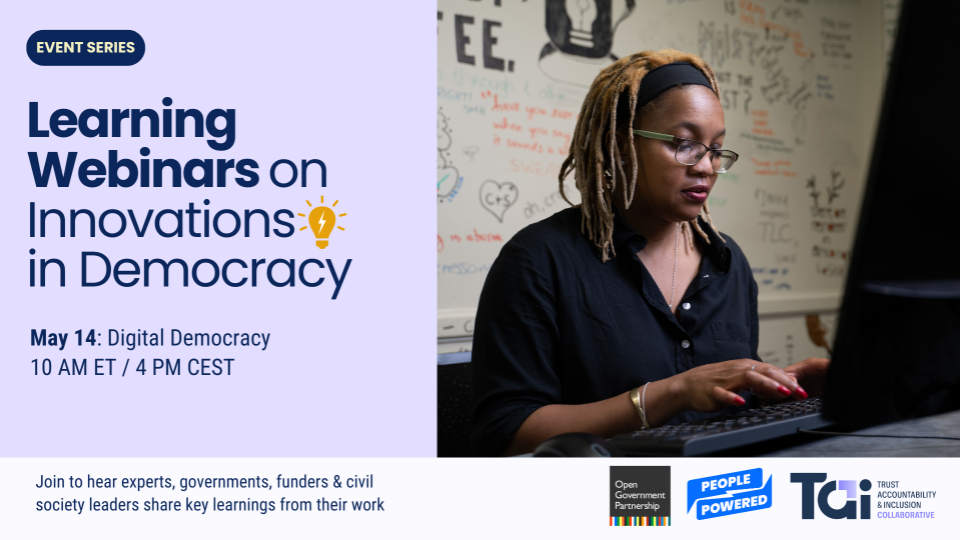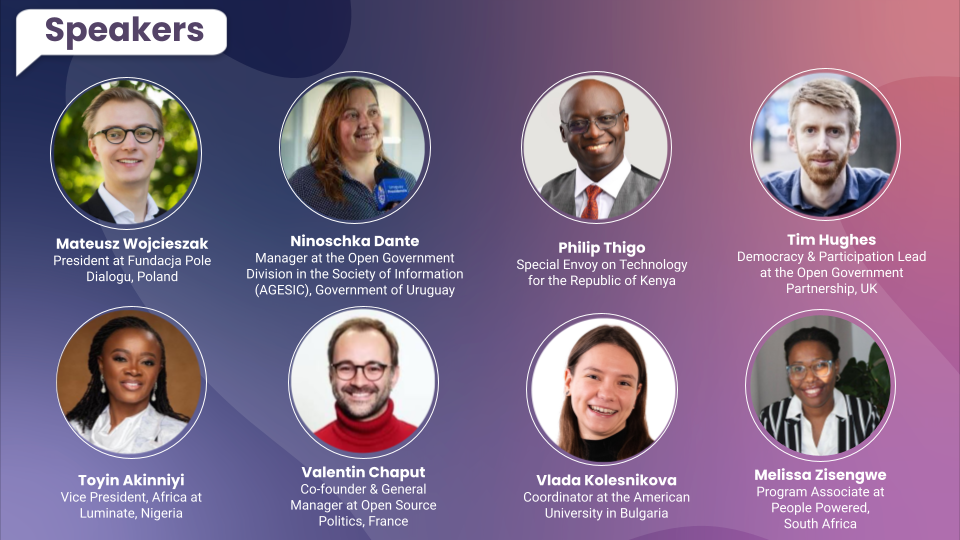Learnings & innovations in digital democracy: Webinar highlights
/Many governments, organizations, and funders are grappling with digital challenges such as AI governance, the influence of big tech, data privacy, and more. How do we ensure an inclusive and equitable digital society? This is why People Powered, Open Government Partnership, and Trust, Accountability, and Inclusion Collaborative (TAI) convened a discussion between governments, civil society organizations, and funders to share and explore key challenges, best practices, and questions for the digital democracy field.


Here are the key highlights from the digital democracy webinar:
1. Organizations are using participatory democracy to address digital policy challenges
Recently People Powered completed a Digital Democracy Accelerator (DDA), supporting and enabling 12 European organizations to create action plans for public participation in decision-making about digital issues. These included AI development and governance, disinformation and misinformation, lack of regulations for online discrimination, the use of children’s data for commercial purposes, climate data, and the participation of migrants and marginalized groups in developing digital policies.
The program provided participants with individualized expert mentorship and support as they developed an action plan using the Participation Playbook. Participant feedback indicated that the program increased their knowledge and understanding of participatory process and strengthened their skills to advocate for public participation in digital policymaking. While participants are prepared to begin implementing their action plans, they are still concerned that their programs will be impacted by several issues, including the lack of funding and resources and limited support from stakeholders or communities. The participants’ feedback highlighted the importance of mentorship in a digital democracy program, as it provides a space to exchange ideas, build on initial ideas, and adapt action plans based on expert feedback.
During the webinar, two program participants, Mateusz Wojcieszak from Fundacja Pole Dialogu (Poland) and Vlada Kolesnikova American University in Bulgaria, who were awarded additional grants presented their ongoing projects and shared some reflections.
DDA mentor Valentin Chaput, from Open Source Politics, shared three reflections:
In-person workshops for programs focused on digital issues are important as they enable program participants to connect and develop a shared understanding.
Digital policy issues and needs across the program participants often overlapped, highlighting the importance of sufficiently linking them to ensure peer-to-peer learning and sharing best practices.
The flexible adoption of shared resources and tools, particularly open-source tools can be a solution for organizations facing difficulty adopting new technologies
2. Governments can use open government for digital governance
Tim Hughes shared OGP’s three-pronged approach to digital governance and why governments should adopt open government values in digital governance.
The OGP has been enabling governments to make commitments to open digital governance. “At least 40% of member action plans include at least one open digital government commitment. This is where the Open Gov Challenges comes from, it enables members to work towards these challenges to strengthen transparency and public oversight of AI and data protection frameworks.”
The webinar featured two governments, Uruguay and Kenya, who have been applying these principles to their digital transformation efforts. We heard from Ninoschka Dante from the Government of Uruguay and Philip Thigo from the Government of the Republic of Kenya, who have made an OGP commitment to digital governance.
“When we talk about digital democracy,” Dante said, “we are talking about making democracy stronger, building on the existing culture of participation in Uruguay.” To promote an open culture of governance, they have incorporated co-creation standards and are implementing different processes of participation. This enables them to include citizens in the implementation and design of different initiatives and digital policies. Furthermore, to build confidence and ensure feasibility, they actively collaborate and co-create with civil society, academia, women in tech, and the private sector.
Philip Thigo shared that Kenya is focusing on automating 18,000 public services, keeping in mind the need for infrastructure and different communities such as youth, women, rural, and disabled communities. However, he noted that inclusive digital governance is not just about digital infrastructure and providing digital services, it is also about citizen trust. “We are concerned with how we digitize with people to ensure trust-building and collaboration, ensuring that people are included in the digital governance process and implementation reduces the historical inequalities and creates a foundation for a future co-created by citizens.”
He also highlighted the importance of opening channels for meaningful citizen engagement and feedback to ensure that the citizens’ voices are the foundation and drive any decisions about technologies and policies. Therefore governments need to create agile mechanisms where digital policymaking is concerned as innovations are always accelerating. Agility ensures that the government does not rush and can create soft regulations that can be expanded on as more innovations are developed. “It’s not about regulation, it’s about agile governance.”
3. Funders can adopt a multi-sectoral approach to funding digital democracy work
Toyin Akinniyi, Vice President for Africa at Luminate, shared three lessons and best practices as a funder who has been supporting technology for democracy.
First, she stressed the importance of centering users’ safety and human rights in building new technologies and interventions. The harms caused by Big Tech including abusive labor practices, the spread of polarized information, and data breaches have had real-life impacts on people, many of whom are in the Global South where regulations on technology are still in development. Therefore, she emphasized the “safety of users in the developments and the deployment of digital technologies, as well as enacting and enforcing regulations to ensure that tech developers prioritize safety.”
The second point she highlighted is that funders must ensure inclusive and participatory processes. She added that organizations could use AI and emerging technologies in their participatory processes and conversations. While there are some gaps in the space, she noted that there are good examples of this approach, such as the Nigeria AI Collective, which is a multi-stakeholder ecosystem for AI in Nigeria and Africa. Further, she encouraged funders to recognize the critical role of media and civil society’s role across the value chain in stimulating key conversations, highlighting good and bad practices, and the enforcement of new tech laws. As digital technologies can be used to threaten or reduce democratic practices, funders need to continue supporting and protecting the efforts of the media and civic space.
Lastly, she mentioned that funders can have a greater impact on the ecosystem and make a difference by taking a multi-sectoral approach to funding and supporting the field. This includes adopting a context-specific approach to ensure funders are supporting work that addresses each community and its needs.
Resources from the webinar:
Uruguay’s OGP commitment to develop an Observatory on the Governmental Use of Artificial Intelligence
Kenya’s OGP commitment on Safe and Responsible Digital Transformation
For more on funding lessons, Trust, Accountability, and Inclusion Collaborative (TAI) recently released a report on Philanthropic funding landscaping for Healthy Information Ecosystems.
Watch a recording of the webinar below:








